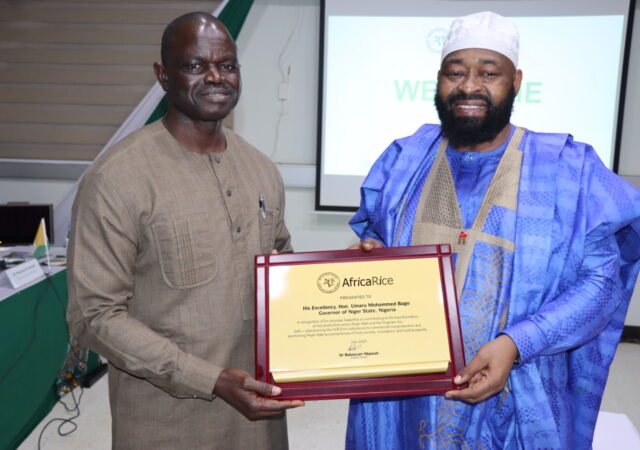As global climate negotiators convene for the 62nd session of the UNFCCC Subsidiary Bodies (SB62) in Bonn, the Alliance for Food Sovereignty in Africa (AFSA) has officially launched a new policy brief urging the integration of agroecology into global and national climate policy frameworks.
Titled “Adaptation, Resilience and Mitigation through Agroecology: A Policy Brief for Enhancing Climate Adaptation and Resilience through Agroecology as a Holistic Approach”, the document outlines AFSA’s strategic priorities in the ongoing climate negotiations, with a clear message: Agroecology is a critical, people-centered pathway for climate resilience in Africa.
The policy brief addresses key issues on the SB62 agenda, including:
- Agriculture under the Sharm El Sheikh Joint Work on Implementation of Climate Action on Agriculture and Food Security (SSJWA)
- The Global Goal on Adaptation (GGA) and National Adaptation Plans (NAPs)
- Climate finance, with a focus on Loss and Damage
- The role of Nationally Determined Contributions (NDCs) in building climate resilience
Agroecology as a Climate Justice Imperative
Dr. Million Belay, General Coordinator of AFSA, emphasized the urgency of shifting Africa’s food systems away from industrial models.
“Africa’s climate future must be rooted in food systems that serve people and ecosystems, not corporations. Agroecology offers a pathway to rebuild resilience, reduce inequality, and nourish sovereignty,” he said.
AFSA’s call is grounded in alarming climate trends: agricultural productivity in Africa has dropped by 34% since 1961, and climate projections warn of shorter growing seasons, increased water scarcity, and more frequent extreme weather events. In response, agroecology is presented as a sustainable, low-cost, and locally driven solution capable of transforming agriculture and food systems in Africa.
“Agroecology is not just a climate solution; it is a climate justice imperative,” said Karen Nekesa, Communication Officer at the Seed and Knowledge Initiative and Co-Chair of the AFSA Climate and Agroecology Working Group.
“It puts power back in the hands of communities and offers a real pathway out of vulnerability, hunger, and systemic dependency.”
Evidence-Based and Grounded in African Realities
The policy brief draws from research and case studies across more than 10 African countries, featuring over 100 documented agroecology initiatives. These studies show agroecology’s potential to lower input costs, revive degraded soils, improve household nutrition, and enhance community-level resilience to climate shocks.
Agroecology is described as a holistic approach that emphasizes:
- Biodiverse and diversified farming systems
- Reduction of chemical inputs in favor of natural, bio-based alternatives
- Strengthened local markets and food sovereignty
- Inclusive participation of women, Indigenous Peoples, and smallholder farmers
AFSA’s Policy Recommendations for SB62
In the brief, AFSA calls on Parties at the UN climate meetings to:
- Officially recognize agroecology under the Sharm El Sheikh Joint Work on Agriculture
- Deliver grant-based and locally governed climate finance for frontline communities
- Ensure access to finance for smallholder farmers and marginalized groups
- Adopt inclusive GGA indicators that reflect the complexity of adaptation
- Institutionalize equitable participation for women and Indigenous Peoples
- Strengthen accountability and transparency in climate finance delivery mechanisms
As SB62 progresses in Bonn, AFSA’s message is clear: Africa’s climate resilience must be built from the ground up, led by communities, rooted in biodiversity, and backed by inclusive policies and finance.








melbet сегодня зеркало [url=http://melbet1036.ru]melbet сегодня зеркало[/url]
1win [url=1win3062.ru]1win3062.ru[/url]
mostbet [url=http://mostbet4077.ru/]http://mostbet4077.ru/[/url]
888strz [url=https://888starz-casino.com.ru/]https://888starz-casino.com.ru/[/url] .
mostbet [url=https://mb1113.ru/]https://mb1113.ru/[/url]
mostbet [url=https://mostbet4078.ru]https://mostbet4078.ru[/url]
mostbet [url=https://www.mostbet4085.ru]https://www.mostbet4085.ru[/url]
1 x win [url=https://1win3070.ru/]https://1win3070.ru/[/url]
888starz bonus bez depozytu [url=www.888starz-english.com]888starz bonus bez depozytu[/url] .
мостбет [url=http://mostbet4083.ru]http://mostbet4083.ru[/url]
авиатор игра скачать на телефон [url=https://1win3069.ru/]https://1win3069.ru/[/url]
1win cashback [url=http://1win3067.ru/]http://1win3067.ru/[/url]
888 starz casino eg [url=http://multitaskingmaven.com]888 starz casino eg[/url] .
ваучер для 1win [url=https://1win3066.ru]https://1win3066.ru[/url]
mostbet mod apk download [url=www.mostbet-download-app-apk.com]mostbet mod apk download[/url] .
mostbet uz com [url=https://mostbet4071.ru/]https://mostbet4071.ru/[/url]
скачать 888starz на телефон андроид [url=https://www.888-starz.world]скачать 888starz на телефон андроид[/url] .
1win [url=http://1win3071.ru]http://1win3071.ru[/url]
действующий промокод на мелбет [url=www.melbet3004.com]www.melbet3004.com[/url]
bbruth 1win [url=www.1win3044.com]bbruth 1win[/url]
мелбет скачать казино [url=melbet3003.com]melbet3003.com[/url]
tahmil barnamaj 888starz [url=http://www.egypt888starz.net]tahmil barnamaj 888starz[/url] .
1win promo qeydiyyat [url=http://1win3043.com/]http://1win3043.com/[/url]
1win que es [url=https://1win3045.com]1win que es[/url]
lbh altyarh fy 1xbet [url=https://www.arabic1xbet.com]lbh altyarh fy 1xbet[/url] .
1win daxil ol [url=https://www.1win3038.com]https://www.1win3038.com[/url]
1win suallar və cavablar [url=http://1win3037.com/]1win suallar və cavablar[/url]
1win login app [url=http://www.1win-in1.com]1win login app[/url] .
8888 starz [url=www.888starz-downloads.com/]8888 starz[/url] .
mostbet qeydiyyat yoxlaması [url=https://mostbet4049.ru/]https://mostbet4049.ru/[/url]
mostbet az giriş bloku [url=https://mostbet4050.ru]https://mostbet4050.ru[/url]
mostbet aviator təlimat [url=https://www.mostbet4048.ru]mostbet aviator təlimat[/url]
мостбет мобильная версия [url=mostbet4051.ru]мостбет мобильная версия[/url]
mostbet ios yukle [url=www.mostbet4052.ru]mostbet ios yukle[/url]
mostbet lapplication mobile [url=http://www.mostbetdownload-apk.com]mostbet lapplication mobile[/url] .
напольные вазоны для комнатных цветов [url=http://kashpo-napolnoe-rnd.ru]напольные вазоны для комнатных цветов[/url] .
aviator 1win [url=https://1win1138.ru]https://1win1138.ru[/url]
казино 888starz [url=888starz.com.ru]казино 888starz[/url] .
1 win официальный сайт регистрация [url=http://1win1139.ru/]http://1win1139.ru/[/url]
Hello friends!
I came across a 118 very cool website that I think you should dive into.
This site is packed with a lot of useful information that you might find valuable.
It has everything you could possibly need, so be sure to give it a visit!
[url=https://www.chiangraitimes.com/health/sunwear-or-how-to-protect-your-skin-at-the-beach/]https://www.chiangraitimes.com/health/sunwear-or-how-to-protect-your-skin-at-the-beach/[/url]
Wonderful goods from you, man. I have understand your stuff prior to and you’re just extremely excellent. I really like what you have got here, certainly like what you are saying and the way in which through which you are saying it. You are making it entertaining and you continue to care for to keep it wise. I cant wait to read far more from you. That is actually a terrific site.
Hello everyone!
I came across a 118 useful resource that I think you should explore.
This tool is packed with a lot of useful information that you might find valuable.
It has everything you could possibly need, so be sure to give it a visit!
[url=https://lpfa-nrw.de/allgemein/kokosoel-ein-alleskoenner-und-beauty-wunder/]https://lpfa-nrw.de/allgemein/kokosoel-ein-alleskoenner-und-beauty-wunder/[/url]
I’m usually to blogging and i really appreciate your content. The article has actually peaks my interest. I am going to bookmark your website and hold checking for brand new information.
Fantastic beat ! I wish to apprentice while you amend your web site, how can i subscribe for a blog website? The account helped me a acceptable deal. I had been a little bit acquainted of this your broadcast offered bright clear idea
Good day! Do you know if they make any plugins to assist with Search Engine Optimization? I’m trying to get my blog to rank for some targeted keywords but I’m not seeing very good results. If you know of any please share. Many thanks!
Nice post. I was checking continuously this blog and I am impressed! Very helpful info specifically the last part 🙂 I care for such info a lot. I was looking for this certain information for a long time. Thank you and good luck.
sweet bonanza xmas slot png [url=sweet-bonanza3003.ru]sweet bonanza xmas slot png[/url]
Just want to say your article is as surprising. The clarity in your post is simply excellent and i could assume you are an expert on this subject. Fine with your permission let me to grab your RSS feed to keep updated with forthcoming post. Thanks a million and please carry on the gratifying work.
This is my first time pay a quick visit at here and i am in fact pleassant to read all at alone place.
Spot on with this write-up, I absolutely believe that this amazing site needs far more attention. I’ll probably be returning to read through more, thanks for the info!
app 1win [url=www.1win3002.com]app 1win[/url]
It’s genuinely very complicated in this busy life to listen news on TV, thus I just use internet for that purpose, and take the hottest news.
Great work! This is the kind of information that are meant to be shared across the internet. Shame on the search engines for no longer positioning this put up higher! Come on over and talk over with my site . Thanks =)
What’s up friends, how is the whole thing, and what you desire to say about this post, in my view its actually remarkable for me.
télécharger 1win [url=https://www.1win3006.com]télécharger 1win[/url]
It’s amazing to pay a visit this web site and reading the views of all mates about this piece of writing, while I am also eager of getting knowledge.
Please let me know if you’re looking for a writer for your weblog. You have some really great posts and I feel I would be a good asset. If you ever want to take some of the load off, I’d really like to write some material for your blog in exchange for a link back to mine. Please shoot me an email if interested. Cheers!
After looking over a few of the articles on your web page, I really appreciate your technique of blogging. I saved as a favorite it to my bookmark website list and will be checking back in the near future. Please visit my website too and let me know your opinion.
Appreciate the recommendation. Will try it out.
[b]альтернативное зеркало — как быстро достучаться до кракен маркет платформа -> [url=k.2kraken.to] актуальное зеркало кракен[/url][/b]
Привет всем, хотел объявить ценной информацией для тех, кто ищет рабочие ресурсы.
Актуальное зеркало кракен бывает только одно – всё остальное фейки Скажу простую, но очень важную вещь – актуальное зеркало кракен бывает только одно. Всё остальное – мусор. Фейки. Подделки для доверчивых. Я это говорю не просто так – я через всё это прошёл. Я видел, как люди теряют доступ, теряют деньги, потому что кликнули не туда. А всё потому, что не разобрались, не подумали. А надо думать. Надо проверять! Когда я начал искать рабочее зеркало кракен, мне попалось штук двадцать ссылок. Все якобы “самые новые”, “точно рабочие”, “сто процентов”. Да ну! Большинство – замануха. Или сайты, где даже интерфейс кривой, или такие, где всё выглядит красиво, но нажатие кнопки – и всё, ты уже попался и больше не хозяин своих данных. Актуальное зеркало кракен – это как секретный код. Нет его в открытом доступе. И не найти за одну минуту через обычный поиск. Зато если знаешь, где искать – Tor, проверенные источники, своя сеть контактов – тогда находишь. Заходишь, и всё работает, как надо. Без рекламы, без ошибок, без угроз. Просто надёжно. И вот в чём фишка: рабочее зеркало кракен – это всегда только одно актуальное зеркало в моменте. Как только его сливают везде, оно умирает. Его блокируют, заменяют, и снова начинается игра в угадайку. Поэтому если у тебя есть настоящее зеркало – держи его при себе. Не кричи о нём везде. Хочешь работать – будь умнее остальных. Актуальное зеркало кракен не ищут толпой. А находят те, кто не ведётся на первую попавшуюся ссылку. Только так ты реально получаешь доступ. Всё остальное – не имеет значения.
Сегодня я протестировал несколько ссылок, и вот что стабильно работает:
[url=k.2kraken.to]рабочее зеркало кракен[/url] — k.2kraken.to
[url=2kraken.to]кракен ссылка[/url] — 2kraken.to
Пишите, если нужна помощь.
Инфа проверена лично (Саратов).
[i]kraken link скрытая площадка тэлега [/i]
Hello there, I do think your website could be having web browser compatibility problems. Whenever I look at your site in Safari, it looks fine however, when opening in Internet Explorer, it has some overlapping issues. I simply wanted to provide you with a quick heads up! Besides that, excellent website!
After looking into a handful of the articles on your website, I truly appreciate your technique of writing a blog. I saved it to my bookmark site list and will be checking back soon. Take a look at my website as well and let me know how you feel.
This is really attention-grabbing, You are an excessively skilled blogger. I have joined your feed and stay up for searching for more of your excellent post. Additionally, I have shared your website in my social networks
Необходим проверенный электромонтажник? Мы выполняем любые [url=https://irkelektrik.ru/]услуги электрика в Иркутске[/url] быстро, качественно и с гарантией!
* Установка электропроводки и автоматов
* Замена розеток, выключателей, освещения
* Монтаж электрощитов
* Подключение бытовой техники
Работаем круглосуточно – выезжаем в день обращения! Опытные электромонтажники, передовое оборудование , обязательное соблюдение норм безопасности.
[url=https://irkelektrik.ru/]Заказать электрика в Иркутске[/url] прямо сейчас! Исправим любые неполадки с электричеством!
An outstanding share! I have just forwarded this onto a colleague who has been conducting a little homework on this. And he in fact bought me breakfast due to the fact that I discovered it for him… lol. So let me reword this…. Thanks for the meal!! But yeah, thanx for spending some time to discuss this topic here on your website.
What i do not realize is if truth be told how you are now not actually much more well-appreciated than you may be now. You are so intelligent. You know thus considerably with regards to this subject, produced me personally imagine it from so many various angles. Its like women and men don’t seem to be fascinated unless it is something to do with Girl gaga! Your individual stuffs great. Always care for it up!
It’s genuinely very difficult in this full of activity life to listen news on Television, thus I only use internet for that reason, and obtain the most up-to-date news.
может ли фурункул пройти сам [url=http://www.mazi-ot-furunkula.ru]http://www.mazi-ot-furunkula.ru[/url] .
лечение фурункула на ранней стадии [url=http://mazi-ot-furunkula.ru/]http://mazi-ot-furunkula.ru/[/url] .
Hola! I’ve been following your site for a long time now and finally got the courage to go ahead and give you a shout out from New Caney Texas! Just wanted to mention keep up the fantastic work!
You’re so interesting! I don’t suppose I have read through anything like that before. So great to find another person with a few original thoughts on this topic. Seriously.. thanks for starting this up. This website is one thing that’s needed on the internet, someone with a bit of originality!
I do not even know how I ended up here, however I thought this publish used to be great. I do not recognise who you might be but definitely you are going to a well-known blogger for those who aren’t already. Cheers!
you are truly a excellent webmaster. The web site loading speed is amazing. It kind of feels that you’re doing any distinctive trick. Also, The contents are masterpiece. you have performed a wonderful process in this subject!
Yes! Finally something about %keyword1%.
купить диплом вуза [url=https://arus-diplom5.ru]https://arus-diplom5.ru[/url] .
Howdy! Quick question that’s totally off topic. Do you know how to make your site mobile friendly? My web site looks weird when viewing from my iphone4. I’m trying to find a theme or plugin that might be able to correct this issue. If you have any recommendations, please share. With thanks!
купить диплом техникума [url=http://arus-diplom8.ru]http://arus-diplom8.ru[/url] .
медицинский аппарат узи [url=http://www.kupit-uzi-apparat1.ru]http://www.kupit-uzi-apparat1.ru[/url] .
диплом купить с занесением в реестр [url=www.arus-diplom7.ru]www.arus-diplom7.ru[/url] .
Does your website have a contact page? I’m having trouble locating it but, I’d like to shoot you an email. I’ve got some suggestions for your blog you might be interested in hearing. Either way, great website and I look forward to seeing it grow over time.
sweet bonanza dice [url=http://sweet-bonanza3003.ru]http://sweet-bonanza3003.ru[/url]
not sure if this is useful this just appeared: [url=https://skalierung-digital.de]lol idk[/url] then because clearly I had nothing better to do and then this happened [url=https://ulrich-rasche-gitarre.de]also weirdly alive[/url] can’t sleep anyway
Мы предлагаем документы любых учебных заведений, которые расположены на территории всей России. Заказать диплом любого ВУЗа:
[url=http://chateando.net/read-blog/15273_kupit-diplom-s-registraciej-v-reestre.html/]chateando.net/read-blog/15273_kupit-diplom-s-registraciej-v-reestre.html[/url]
I’ve learn several excellent stuff here. Definitely price bookmarking for revisiting. I surprise how so much attempt you place to create this type of fantastic informative website.
An added important area is that if you are a mature person, travel insurance regarding pensioners is something you should really contemplate. The older you are, a lot more at risk you’re for making something terrible happen to you while in another country. If you are certainly not covered by a few comprehensive insurance, you could have quite a few serious complications. Thanks for sharing your good tips on this web site.